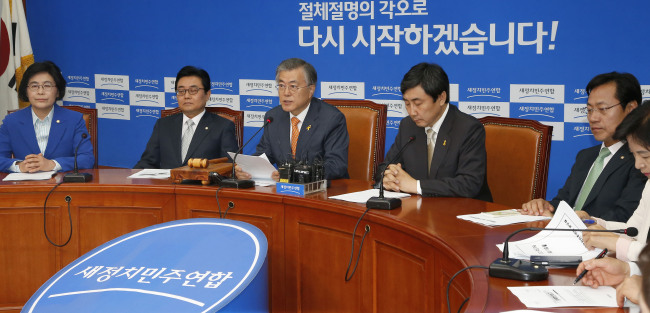Opposition’s factional feud intensifies
Two senior members miss daily meeting after verbal figh
By Korea HeraldPublished : May 11, 2015 - 21:30
Two senior lawmakers of the main opposition party refused to attend a party meeting on Monday following a verbal fight last week, highlighting a deepening rift in the party in the wake of last month’s election whitewash.
Reps. Jung Cheong-rae and Joo Seung-yong of the New Politics Alliance for Democracy gave no reason for their absence. They had exchanged heated words last Friday, continuing to trade blame over the party’s defeats in the April parliamentary by-elections.
NPAD chair Rep. Moon Jae-in apologized for the incident.
“Last Friday’s brawl was an embarrassment. How can we criticize the Park Geun-hye administration if we fail to show unity, and fail to gain the trust of our citizens?”
Reps. Jung Cheong-rae and Joo Seung-yong of the New Politics Alliance for Democracy gave no reason for their absence. They had exchanged heated words last Friday, continuing to trade blame over the party’s defeats in the April parliamentary by-elections.
NPAD chair Rep. Moon Jae-in apologized for the incident.
“Last Friday’s brawl was an embarrassment. How can we criticize the Park Geun-hye administration if we fail to show unity, and fail to gain the trust of our citizens?”

Analysts said the Jung-Joo altercation represents a fight between the NPAD’s two main factions, as Jung and Joo are senior members of the pro-Rohs and the non-Rohs, respectively.
How the feud ends will affect which faction comes out with more clout in the party. How fast the feud ends will affect the NPAD’s public approval ratings, and its ability to compete with the ruling Saenuri Party on policy issues, such as the public service pension reforms, observers said.
The clash began after Joo repeated his desire to resign from the party’s Supreme Council last week. Joo had urged other council members to resign, especially Moon, the leader of the pro-Rohs, in order to “take responsibility” for the party’s losses in all four of the April 29 by-elections.
Analysts had expected the NPAD to win in the by-elections, due to ongoing prosecutorial investigations into leading ruling bloc figures accused of taking bribes.
But Jung called Joo’s criticism “blackmail” that threatened to destroy the party’s unity amid falling approval ratings and the electoral defeats.
Joo marched out of the meeting room after the brawl and has since been at his home in Yeosu, South Jeolla Province. On Monday, Joo turned away Jung who had traveled to Yeosu to meet Joo, refusing to meet him.
“I will not retrieve my resignation letter,” Joo said after his refusal to meet Jung.
Moon and most of the pro-Roh group have faced heavy criticism for the April 29 electoral defeat. Joo and the non-Rohs accused them of pursuing “divisive” and “factionalist” party politics, by dominating the party’s key posts, and excluding other factions.
“Joo’s comments last week represented the brewing dissatisfaction of the pro-Roh led party leadership,” said Choi Young-jin, professor of Korean politics at Chung-Ang University.
The pro-Rohs is a group of NPAD lawmakers who began their political careers during the Roh Moo-hyun administration. The faction is the NPAD’s dominant group. Moon is the faction’s de facto leader.
Joo is a senior member of the non-Rohs, a coalition of NPAD lawmakers who oppose the pro-Rohs. Most trace their political roots to those who began their careers under ex-President Kim Dae-jung and other South Korean liberals based in the Jeolla region.
The feud between the party’s leading groups has contributed to the party’s falling ratings, one analyst said.
“There are many voters who are against the Park Geun-hye administration and the governing Saenuri Party,” said Chung Jin-min, professor of politics at Myongji University in Seoul.
“But that doesn’t mean they will start supporting the NPAD if the main opposition fails to offer policy alternatives to voters,” he added.
The ongoing in-house feud is impeding efforts within the NPAD to design policies that can compete with those of Park and the Saenuri Party, experts said.
“Having factions and ensuing feuds within a large party is natural,” Chung said. The NPAD is South Korea’s No. 2 party with 130 of the country’s 298 lawmakers under its banner. The Saenuri Party has 160 legislators.
“But Korean politics is too figure-based. The factionalist infighting between the pro-Rohs, largely supporters of Moon, and the non-Rohs, largely those against him, is causing an unproductive chain of events that prevents the NPAD from coming up with policy alternatives to the ruling bloc,” Chung added.
By Jeong Hunny (hj257@heraldcorp.com)
-
Articles by Korea Herald




![[KH Explains] No more 'Michael' at Kakao Games](http://res.heraldm.com/phpwas/restmb_idxmake.php?idx=644&simg=/content/image/2024/04/28/20240428050183_0.jpg&u=20240428180321)













![[Herald Interview] Mistakes turn into blessings in street performance, director says](http://res.heraldm.com/phpwas/restmb_idxmake.php?idx=652&simg=/content/image/2024/04/28/20240428050150_0.jpg&u=20240428174656)
